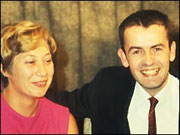 |
| Mr Brooke has been exchanged for two Soviet spies |
|
1969: Briton freed from Soviet prison
|
Artificially 1969:
The British lecturer Gerald Brooke has been returned to London after four years in a Soviet jail.
Mr Brooke, 31, was arrested by the Russian secret service, the KGB, in April 1965 for smuggling anti-Soviet leaflets.
The Russian teacher was sentenced to five years' detention, one year in prison, four years in labour camps, for "subversiveanti-Soviet activity on the territory of the Soviet Union" at Moscow City Court three months later.
Speaking at Heathrow airport, where he arrived at 1117 BST, Mr Brooke revealed the Russian authorities only told him he was being sent home 24 hours ago.
His release, nearly a year early, came after negotiations between the British and Russian Governments.
Harold Wilson's Labour Government has been criticised by the opposition for jeopardising British security by agreeing to release Soviet agents Peter and Helen Kroger in exchange for Gerald Brooke.
Looking pale and thin as he stepped off his plane, an Aeroflot Ilyushin 62 jet, wearing his old school tie - Firth Park Grammar in Sheffield - Mr Brooke was startled by the phalanx of media waiting for him.
He explained he had been suffering from an inflamed colon, aggravated by prison food, and he was not used to speaking English or seeing so many people.
His 29-year-old wife Barbara, a librarian, greeted him with his mother Marion, 74.
They prevented him from answering too many questions about his ordeal.
All he said about prison conditions is "they were not particularly soft".
Mr Brooke is looking forward to relaxing at home in Finchley this evening.
Mr and Mrs Kroger will be released from prisons in Britain in October after serving just nine years of their 20-year sentence for their part in the Portland Spy case.
British intelligence services discovered the couple had seriously damaged national security by passing secret details about the country's submarine activities to the USSR.
|